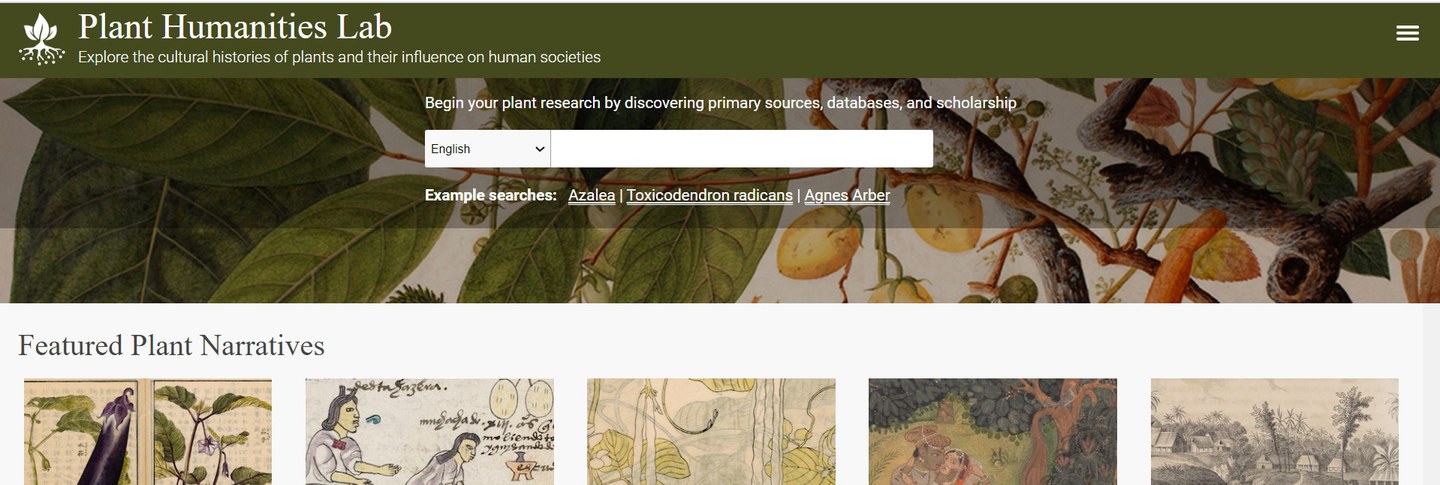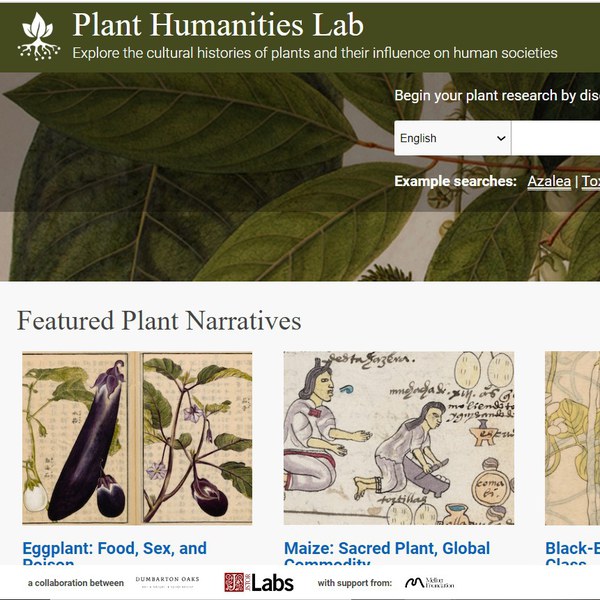The Plant Humanities Initiative at Dumbarton Oaks invites applications for two-week virtual faculty residencies in June 2024. The residencies are designed to facilitate the integration of the Plant Humanities Lab, and associated resources developed by the Plant Humanities Initiative, into curricula focused on plants and people. We welcome applications from teachers at two- and four-year colleges and universities who are interested in integrating primary and digital sources on plants into their teaching. Participants will receive a stipend of $800 upon successful completion of the residency.
The residency will take place over two weeks (June 3-14) of virtual seminars and workshops. The total time commitment will be approximately 20 – 25 hours. The program includes seminars to discuss different methodological and theoretical approaches; training in the use of the open access digital software, Juncture, that powers the Lab; and group sessions where we workshop teaching modules and ideas drawing on the Plant Humanities Lab. Several of the seminars are participant-led, and we will invite you to share readings and research topics for the group. Through our discussions, we obtain invaluable feedback from our faculty participants on future directions for the Lab. Above all, this program helps expand the growing community of plant humanities researchers and teachers.
Applicants are invited to submit a résumé and one-page statement of interest and description of their teaching needs through Embark by February 15, 2024, at 11:59 p.m. Eastern. Participants will be notified by March 15, 2024.
More on the Plant Humanities Lab
The Plant Humanities Lab is an innovative digital platform that supports the interdisciplinary study of plants from the various perspectives of the arts, sciences, and humanities. In its current phase, the site contains 25 visual essays on plants with rich cultural histories that can be used to introduce students to different perspectives on plant-human interactions, from economic, medicinal, and ornamental uses to the role of indigenous knowledge and colonial botany. The visual essay tool demonstrates how primary sources (such as herbarium specimens and botanical illustrations) can be integrated within narratives that also draw on large databases such as iDigBio and the Biodiversity Heritage Library to tell complex and engaging stories about plants. Students can use the Lab’s search interface to mine these digital repositories for information, and the visual essay tool to create their own narratives and presentations. You can read more about the pedagogical goals of the Lab here.
Past Participants
2023
- Laura Ahola-Young, Idaho State University
- Sahar Bazzaz
- Sarah Benharrech, University of Maryland, College Park
- Frederica Bowcutt
- Terese Gagnon, University of Copenhagen
- Megan Kaminski, University of Kansas
- Lindi Masur, Sewanee: The University of the South
- Sarah Osterhoudt, Indiana University
- Niall Peach, Coe College
- Jon Pitt, University of California, Irvine
- Lily Wong, University of Miami
2022
- Anthony Baniaga, University of California Los Angeles
- Judy Bullington, Belmont University
- Milton Fernando Gonzalez, Catholic University of Leuven
- Timur Hammond, Syracuse University
- Tom Hart, Franklin and Marshall College
- Joela Jacobs, University of Arizona
- Suryatapa Jha, Claremont McKenna College
- Shana Klein, Kent State University
- Rosalyn LaPier, University of Montana
- Lisa McCarty, Southern Methodist University
- Shalini Sengupta, University of Sussex
- Yizhou Wang, Heidelberg University
2021
- Christopher M. Blakley, Occidental College
- Kyra N. Krakos, Maryville University
- Alicia L. Monroe, University of North Carolina at Chapel Hill
- Romita Ray, Syracuse University
- Sumana Roy, Ashoka University
- Ashanti Shih, Wellesley College
- Leah Sobsey, University of North Carolina at Greensboro
- Citlali Sosa-Riddell, Los Angeles Pierce College
- Amy E. Traver, Queensborough Community College, City University of New York

